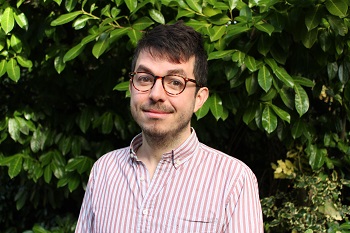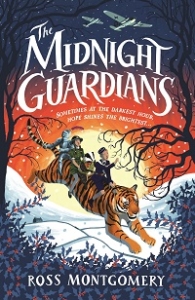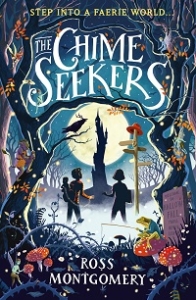
This article is in the Featured Author and Interviews Categories
An Interview with Costa Book Award shortlisted author Ross Montgomery
Michelle Pauli interviews Ross Montgomery, who is on the shortlist for the Costa Children’s Book Award for a second time.
The Midnight Guardians shouldn’t work. Take some imaginary friends – an enormous tiger, a dapper badger and a tiny cantankerous  knight – and bring them to life, add in a Second World War Blitz setting with an evacuee and a Kindertransport refugee, some magical realism and then throw in a dollop of olde English folklore for good luck. No, it really shouldn’t work, as author Ross Montgomery is the first to acknowledge. Yet, somehow, it works perfectly. The Midnight Guardians is an absolutely gorgeous tale that has quite rightly been shortlisted for the Costa Children’s Book of the Year Award.
knight – and bring them to life, add in a Second World War Blitz setting with an evacuee and a Kindertransport refugee, some magical realism and then throw in a dollop of olde English folklore for good luck. No, it really shouldn’t work, as author Ross Montgomery is the first to acknowledge. Yet, somehow, it works perfectly. The Midnight Guardians is an absolutely gorgeous tale that has quite rightly been shortlisted for the Costa Children’s Book of the Year Award.
How on earth did Montgomery bring all those elements together in a page-turning adventure story that captures the very essence of classic children’s literature?
‘What I’ve always found, whenever I write books, is that there’ll be three different ideas or things that I’m interested in at that moment that become planted in my mind and they all just end up growing into each other and become almost inextricable,’ Montgomery explains.
With The Midnight Guardians those influences were a volume of the Sandman comics, called A Game of You (‘NOT child appropriate!’ he says, firmly), a dawning realisation of how much evidence of the Second World War was still visible in London and a sudden revelation while sitting in a clearing of trees reading Alan Garner’s classic children’s fantasy novel The Weirdstone of Brisingamen.
‘This was a proper old English folk tale, with mythology. And I was like, “I forgot that books used to feel like this. These are like the books that I read when I was a kid”,’ he remembers.
The Second World War backdrop to the story meant this was also Montgomery’s first foray into historical fiction, a new direction he found both fascinating and challenging.
‘I think I underestimated how much work it was going to be,’ he notes, pointing out the difficulties of ensuring that the balance of real-life material and made-up story is not ‘glib’, especially when involving historical situations as important and sensitive as Kindertransport. He is also critical of ‘lazily written historic fiction where it’s just characters stating the things that have happened on certain dates’. He was additionally keen to avoid the common trap of falling in love with his own research and cramming the story with historical detail at the expense of plot and character.
‘The way that I ended up feeling about it was that the process needed to feel more like a painter assembling a palette of colours,’ he reveals. ‘You develop a wealth of knowledge and understanding and feeling about that period of time. And then you paint a picture with those colours but you don’t use all of them. You might just do a little dab but the palette gives you a range to work with.’
However, Montgomery also discovered the joys of serendipitous discoveries. Conversations with a very elderly family member who had been eight years old and living in Bethnal Green during the Blitz provided fascinating insights into the experiences of a boy at that time – and was the reason the book’s young hero Col wears a Boys’ Brigade uniform for much of the story.
Research into dates provided another breakthrough. Originally the book was going to be set between Christmas and new year – ‘that bit of the year that always feels very weird and elastic and doesn’t really feel like a real time’ as Montgomery describes it. He then widened it out to include both Christmas and the 21 December, as the darkest day of the year in a tale all about dark and light. He then realised that Hanukkah fell perfectly within those dates in 1940, resulting in a strand that provides some of the most powerful imagery of the whole book.
‘I think that was an example of when the research side of it is really like a gift that just changes everything. And that makes the frustrations of it worth it. When you realise you want to do something and then to suddenly be given that, it felt heaven sent,’ he says.
Despite the current and very justified excitement around The Midnight Guardians due to its Costa shortlisting, Montgomery has  another fantastic (in every sense) book out right now, The Chime Seekers, A brilliantly bonkers and dark tale of a boy who travels to the underworld to rescue his baby sister who has been stolen by a faerie, it is a thrilling read and also distinctly odd – in a good way. Montgomery references Labyrinth but there is also a Gaimanesque tinge to The Chime Seekers with magic, a terrifyingly evil villain and all-enveloping world building.
another fantastic (in every sense) book out right now, The Chime Seekers, A brilliantly bonkers and dark tale of a boy who travels to the underworld to rescue his baby sister who has been stolen by a faerie, it is a thrilling read and also distinctly odd – in a good way. Montgomery references Labyrinth but there is also a Gaimanesque tinge to The Chime Seekers with magic, a terrifyingly evil villain and all-enveloping world building.
It feels somehow unsurprising that The Chime Seekers is Montgomery’s ‘lockdown novel’ and that the weirdness of those times fed into it.
‘I was living in Brixton during the first lockdown and one night at nine o’clock there was an unfamiliar sound,’ he recounts. ‘We realised it was the Lambeth townhall clock chiming. We lived over a mile away beside the busiest road in London, and we didn’t even know it was physically possible to hear it but the world was so silent that suddenly you could hear this faint bell. And it was just so creepy. It was amazing but spine tingling, uncanny almost. I think that vibe ended up bleeding into the book a bit, the unfamiliarity of stuff. Maybe if it had been written at another time, it wouldn’t have come out quite as creepy as it did.’
While many authors found themselves completely unable to write during the first year of the pandemic, Montgomery hunkered down and worked steadily through a comprehensive chapter-by-chapter synopsis he’d prepared earlier, which helped get him through the difficult times.
‘I started writing stories as a kid because things weren’t always very nice at home. It was my way of dealing with whatever was going on. I could shut myself away and lose myself in my imagination and come up with these stories. I think that, for me, stressful situations are when I’m most imaginative. If I’m going through a tricky period in my life, I find my brain is sort of popping in terms of stuff to think about. So to find myself in a situation where it’s like, this is really bad, it kind of worked, it didn’t get in the way,’ he said.
Although Montgomery escaped into reading and writing stories as a child (and cites his discovery of Terry Pratchett at the age of about 10 as an influence to this day on the blend of comedy and emotion in his own writing), it took a combination of events to spark his interest again as a late teenager: a stay in hospital with little to do but read and write, an inspirational teacher who started a creative writing class and the discovery of ‘cult fiction’ at the age of 17 – think Catch 22 and The Master and Margarita.
Throughout his English and film studies degree, Montgomery collaborated with his sister on a fun project to write a children’s book during the holidays but it all really kicked off when he was working as a teaching assistant after university and had long summer holidays. It ‘felt really natural and obvious to write a book’, which became Alex, the Dog and the Unopenable Door and went on to be shortlisted for the Costa Children’s Book of the Year Award 2013 and the Branford Boase Award 2014.
He wrote his second book, The Tornado Chasers, while teaching full time and doing a teacher training degree – ‘and I nearly had a nervous breakdown, it was just too much’ so he did both part-time for a few years before making the jump into being full-time author (for which he credits fellow children’s author Abi Elphinstone for invaluable advice on how to make the leap to full-time author and still survive financially).
The result is that, next year, Montgomery will have published 26 books in 10 years, and is not showing any signs of slowing down. Next year we can expect another middle grade novel in the summer plus two more Barrington Stoke books and two picture books with illustrator Sarah Warburton.
‘In my dreams of being a creative for a living I’ve always really admired people who were prolific,’ he says. ‘I’ve done more than I ever thought I was going to do in that time. Which is a nice place to be.’
Michelle Pauli is a freelance writer and editor specialising in books and education. She created and edited the Guardian children’s books site.
The Midnight Guardians and The Chime Seekers are published by Walker Books, £7.99 pbk.





